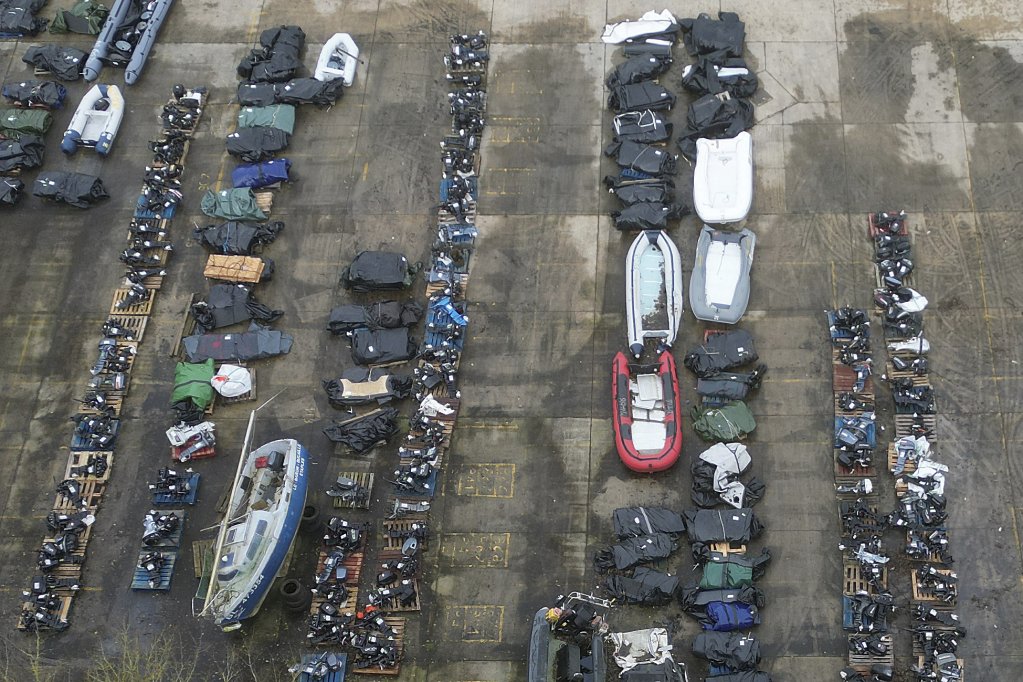Britain's Border Security Chief Martin Hewitt recently said he aims to "drive up the price" of English Channel boat crossings in what the UK's Home Office called the "most extensive international crackdown on organized immigration crime ever launched." These measures will make cross-channel journeys more deadly, say NGOs.
As temperatures rise and the skies become clearer, Channel crossings by migrants in France towards the UK tend to increase. With the peak summer season approaching, the UK's Border Security Chief Martin Hewitt said in an interview with the Financial Times that he wanted to drive up the price of small boat crossings, making them unviable for potential asylum seekers.
Smugglers brought 36,816 migrants across the Channel last year. It's a competitive and multimillion-euro business, but also a deadly one – 78 people drowned in 2024, according to French official data, while trying to cross. The crackdown on smuggling networks will make cross-channel trips more lethal, warned non-governmental organizations.
When asked to elaborate how Hewitt's words would be translated into action, the Home Office offered the following reply: "Under the leadership of Martin Hewitt, the UK’s Border Security Command is leading the most extensive international crackdown on organized immigration crime ever launched, and working closely with the French authorities to stop small boat launches before they happen."
Read AlsoDo Europe's restrictive migration policies really work? And at what cost?
The small boat 'method'
Crossing the Channel via small boats is a technique that human smugglers developed beginning in 2018 in reaction to heightened security around the Channel and the port of Calais. Smugglers had previously sought to hide migrants in trucks but the tougher border controls made this nearly impossible.
The small boat method was relatively simple at first, with smugglers buying boats from sporting-goods stores in France and then bringing migrants across the Channel in them for a certain fee. When authorities began to crack down, smugglers began importing boats from China and Turkey.
Smugglers would later transport the vessels to Germany, before bringing them on to France. Other more lowly members of the criminal networks, or sometimes migrants themselves, would bring the boats to the beaches, or otherwise pilot them downstream through estuaries before picking up migrants who had waded into the sea. The petits mains, or small hands, as the French authorities call them, often take enormous legal risks for only a few hundred euros, or to simply secure a spot on a boat.

Shortly after being elected last July, Prime Minister Keir Starmer said it was his "personal mission to smash the smuggling gangs." Yet the British approach hasn't really been able to make a dent in the smuggling business – with its amorphous, horizontal structure.
Read AlsoUK hosts first major international summit to tackle people smuggling, including social media firms
New measures
Issa Mohamed Omar, one of the sole survivors of the deadly November 2021 shipwreck in the Channel, provided some insights into the logistics of a crossing during a public inquiry. He said in his case, the task of piloting the boat had been delegated to an Egyptian. The smuggler was nowhere near when the boat carrying at least 27 migrants, mostly Iraqi Kurds, sank to the depths of the ocean, according to Omar. Omar said he still hears the screams of those who drowned that night.
In its statement provided to InfoMigrants, the Home Office said, "we are working tirelessly alongside our French colleagues to tackle these dangerous small boat crossings, and we are both equally determined to destroy the criminal gangs who are responsible for this trade."
It highlighted the new measures to be deployed this spring, following a February meeting between UK Home Secretary Yvette Cooper and French Minister of the Interior Bruno Retailleau in northern France. These include increased local policing along the 220-meter coastline, similar to the arrangements deployed during the Paris Olympics, as well as the use of thermal drones, to detect movements in more uninhabited areas.
Léa Biteau, of the French NGO Secours Catholique, slammed the new plan. "Over 6,000 migrants reached the English coast in small boats between January 1 and March 31 of this year – representing a 20-percent increase compared to 2024, when 5,400 migrants crossed the Channel over the same period"
Biteau continued: "Yet we know that France has reinforced its means to control and secure the border and repress; [. . .] 'securing the borders' doesn’t stop people from passing, but it does increase the risks and the violence."
The UK and other countries might be able to disrupt smuggling networks by raising the cost of operations. Yet the only way to truly abolish the trade is to provide safe and legal pathways to the UK, said Flore Judet of another organization that works with migrants in the area, Auberge de migrants. The journey for now remains as dangerous as ever: at least 11 people have died since January 1 while attempting the crossing, turning the Channel into a watery cemetery.
